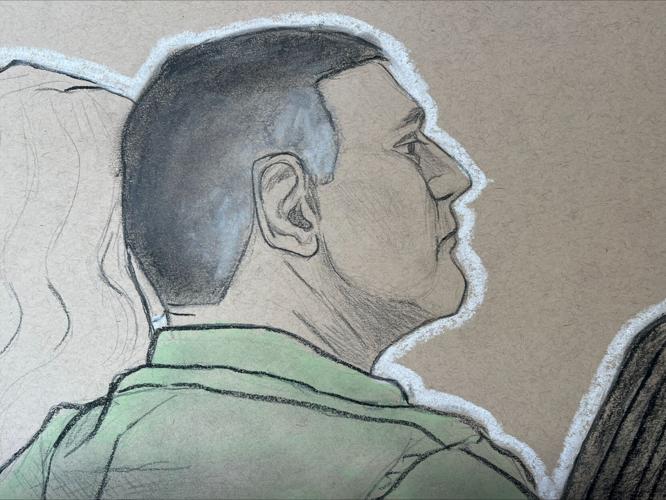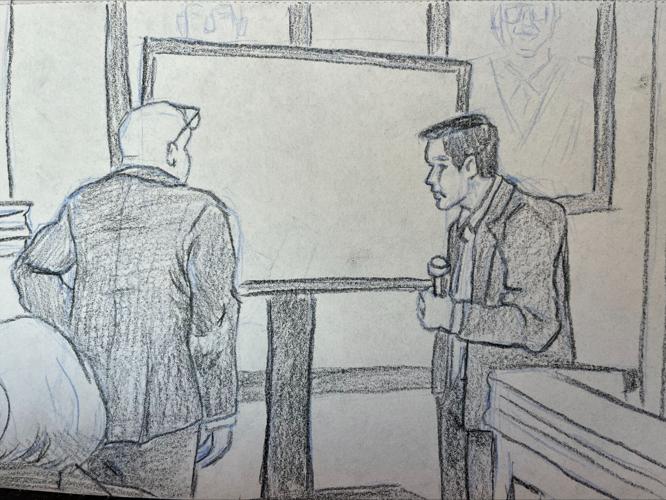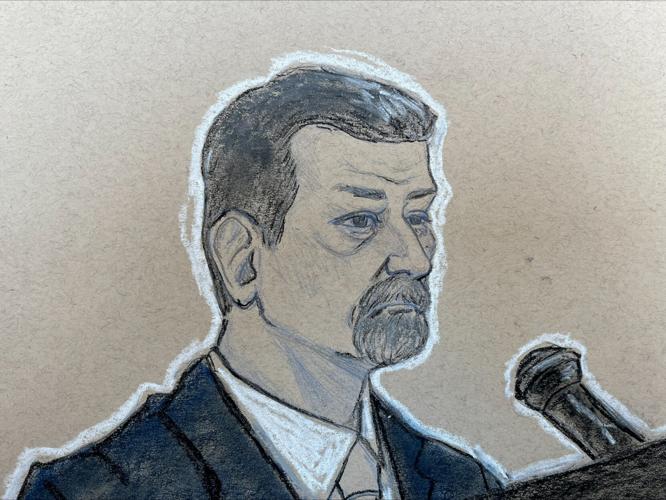BOWLING GREEN, Ky. (WDRB) – The defense began mounting its case in the Crystal Rogers murder trial on Wednesday, with attorneys trying to poke holes in evidence from cell phone data and the work of a K-9 that alerted to human remains.
Brooks Houck and Joseph Lawson are on trial in connection with Rogers’ disappearance in July 2015 in the Bardstown area and presumed death.
Houck, Rogers' boyfriend at the time she vanished, is charged with complicity to commit murder and tampering with physical evidence. He is facing up to 25 years to life in prison. Joseph Lawson is charged with conspiracy to commit murder and tampering with physical evidence, facing up to 25 years behind bars.
The trial was moved from Nelson County to Bowling Green because of the massive amount of publicity the case has drawn.
“This case is about collateral damage” in the effort to prosecute Houck, Kevin Coleman, Lawson’s attorney, said in his opening remarks. “Joey Lawson is the collateral damage in this case.”
Coleman urged jurors to “use your common sense,” when it came to phone data they would hear later in the day concerning actions on the Bluegrass Parkway, where Rogers’ car was found days after her disappearance.
And he hammered home that the prosecution, which wrapped up its case Tuesday, has the burden of proof. Once all the evidence is heard, Coleman said, “you’ll conclude, as we have, that Joey Lawson is not guilty.”
K-9 questions
Houck's attorneys sought to undermine a key part of the prosecution’s case: a car owned by Houck's grandmother that was allegedly seen at the Houck farm that later was found with a hair in the trunk "similar" to Rogers' hair.
A defense witness, K-9 scent detection expert Heath Farthing, testified that the dog that was said to have made the positive detection of human remains didn't have the preferred skills for that kind of work.
He said he believes dogs shouldn't be cross-trained to detect both live scents and human remains, as that dog was. Farthing, a retired Marine, cited concerns he identified while working at Ground Zero in New York following the terror attacks on September 11, 2001.

Heath Farthing, an expert on K-9 training and search and rescue, testifies for the defense during the Crystal Rogers murder trial for Brooks Houck and Joseph Lawson in Bowling Green, Kentucky. June 30, 2025. (Courtesy of Sydney Young)
Most of those dogs, he said, had problems distinguishing between living bodies and corpses. Since them, he testified, such dual training isn’t recommended.
The defense used Farthing's testimony in an attempt to raise concerns about the work of Terry Benjamin — who, with his K-9 Ranger — was tasked by Detective Jamie Brooks with checking the white Buick after it was sold by the Houck family.
Farthing said trainers are required to keep the training records for their K-9s, and Benjamin testified earlier this week he lost Ranger's documentation.
A crux of prosecutor Shane Young's cross examination of Farthing dealt with the dual, or cross, training. Young sought to get Farthing, the defense witness, to acknowledge that a cross-trained K-9 can accurately identify human remains.
"I'm not saying it's impossible," Farthing admitted on cross-examination.
A second defense witness, Porter Hendrix of Vine Grove, Ky., gave an account of a raccoon hunting competition on the night Rogers went missing. On Monday, Ryan Cecil and Daniel Donohue testified they were hunting near the Houck farm on the night of July 3, 2015 and saw a white Buick parked on the road. Cecil said he and two other men were out on Paschal Ballard Road on what was a rainy night.
But Hendrix testified Wednesday that he didn't see any other vehicles on the road and didn't recall being separated from anyone in the hunting party.
Brooks Houck’s sister takes stand
Also taking the stand Wednesday was Rhonda McIlvoy, Houck's sister, who testified that there wasn't a hog farm on her mother's property in 2015. Instead, she said, the family had some pigs in an enclosure.
Earlier in the trial, one of Houck's former employees, Charlie Girdley, testified that Joseph Lawson said he would feed Rogers to the hogs on the farm.
Prosecutors focused last week on window tinting Houck put on his truck not long before Rogers’ disappearance. His defense team argued the tint was added because Houck' and Rogers' son had an eye condition which made him sensitive to light.
McIlvoy elaborated on that condition and testified she didn’t know why her brother added the tint, but she assumed it was because of the child’s eye condition.
Much of the cross-examination of McIlvoy focused on a secret recording of her June 2016 grand jury testimony, which she said she did to “have proof of what I said and what I didn't say."
She also said she was paranoid of threats and accusations in the wake of Rogers’ disappearance and the subsequent investigation.
In a 2023 hearing, prosecutor Shane Young accused McIlvoy, Nick Houck, Rosemary Houck — her brother and mother, respectively — and two other family members of secretly recording their grand jury testimony.
The statute of limitations for that misdemeanor offense has passed.
Asked by prosecutor Jim Lesousky if she kept the recording, McIlvoy said she believed she took it to her mother's house, where the family was living in 2017 while building a house.
They eventually moved into that new house in 2020, she said, and she said she lost track of it over the years.
"In the mix of things, to be honest ... I don't know (where it is)," she said.
Lesousky said the recorder was found in the bedroom at Rosemary Houck's house and questioned McIlvoy as to how she could have lost it if it was so important with Rogers' case still under investigation.
In response to a jury question, McIlvoy also said she also used a cellphone to record and said she thought she recorded more than just her grand jury testimony.
She denied being part of any plot to murder Rogers and said she isn’t aware of her brother’s involvement.
McIlvoy testified that on the day Rogers went missing, she was at the Kentucky Science Center in downtown Louisville with her husband and children and provided police with a photo of them there and in front of the Louisville Slugger Museum.
She later testified her family didn't stay in Louisville that night and drove back to Bardstown sometime after 7 p.m. The total travel time, she estimated, would have taken a little more than an hour.
Cell phone data scrutinized
The bulk of testimony Wednesday afternoon dealt with cell phone data of Steve Lawson, Joseph Lawson’s father.
Adrian Lauf, a computer science and engineering professor at the University of Louisville, testified that cellphone location data shows Steve Lawson wasn't in the area of the Bluegrass Parkway where Crystal Rogers' car was found broken down with a flat tire the day after she disappeared.
However, Lawson, who was convicted earlier this month of conspiracy to commit murder and tampering with physical evidence in the case, admitted in that trial he was guilty of tampering with physical evidence for helping his son move Rogers' vehicle after she disappeared.
Joseph Lawson drove Rogers' car, and his father picked him up when the vehicle had a flat tire, leaving it on the side of Bluegrass Parkway, he testified.
Before they left, Steve Lawson said he reached into Rogers' car and moved the driver's seat forward — because Rogers was short — and removed a miniature Louisville Slugger bat his son carried around regularly. At his son's urging, he called Brooks Houck around midnight and told him the job was done, Steve Lawson said.
Since he was tried separately, Steve Lawson's testimony won't be allowed to be shown to jurors in this trial.
Joseph Lawson's phone had no cellphone data, Lauf said.
Lauf also testified that Rogers' phone didn't have any location data, as some of that technology was relatively new and less developed in 2015.
He faced a barrage of questions from prosecutor Young, who sought to exploit a potential inaccuracy in cellphone data tied to Steve Lawson.
Young tried to show one questionable reading should raise questions about the entire data set, based on remarks Lauf made in a previous case he testified in. For his part, Lauf tried to explain that the prior case had different factors that aren't applicable to the Rogers case.
Speaking hypothetically, Young asked Lauf if the cellphone data presented at trial was his data and he had admitted to moving a car on the Bluegrass Parkway, "Would you call me a liar?"
Defense attorney Brian Butler then interjected. The question wasn't answered.
Judge Charles Simms III said he expects the defense will conclude its case Thursday afternoon. With the Fourth of July holiday weekend looming, he said the trial would likely resume Monday with closing arguments before the jury begins its deliberations.
Related Stories:
Prosecution rests in Crystal Rogers trial before judge says there's 'proof of death’
Hair 'similar' to Crystal Rogers' was found in car tied to Houck family, but DNA test didn't confirm
Defense for Brooks Houck shows text message he sent to Crystal Rogers after she disappeared
Prosecution in Crystal Rogers murder trial tells jury Brooks Houck's brother, mother were involved
Prosecution: Crystal Rogers murder trial is circumstantial case, a 'no body homicide'
Copyright 2025 WDRB Media. All rights reserved.
















